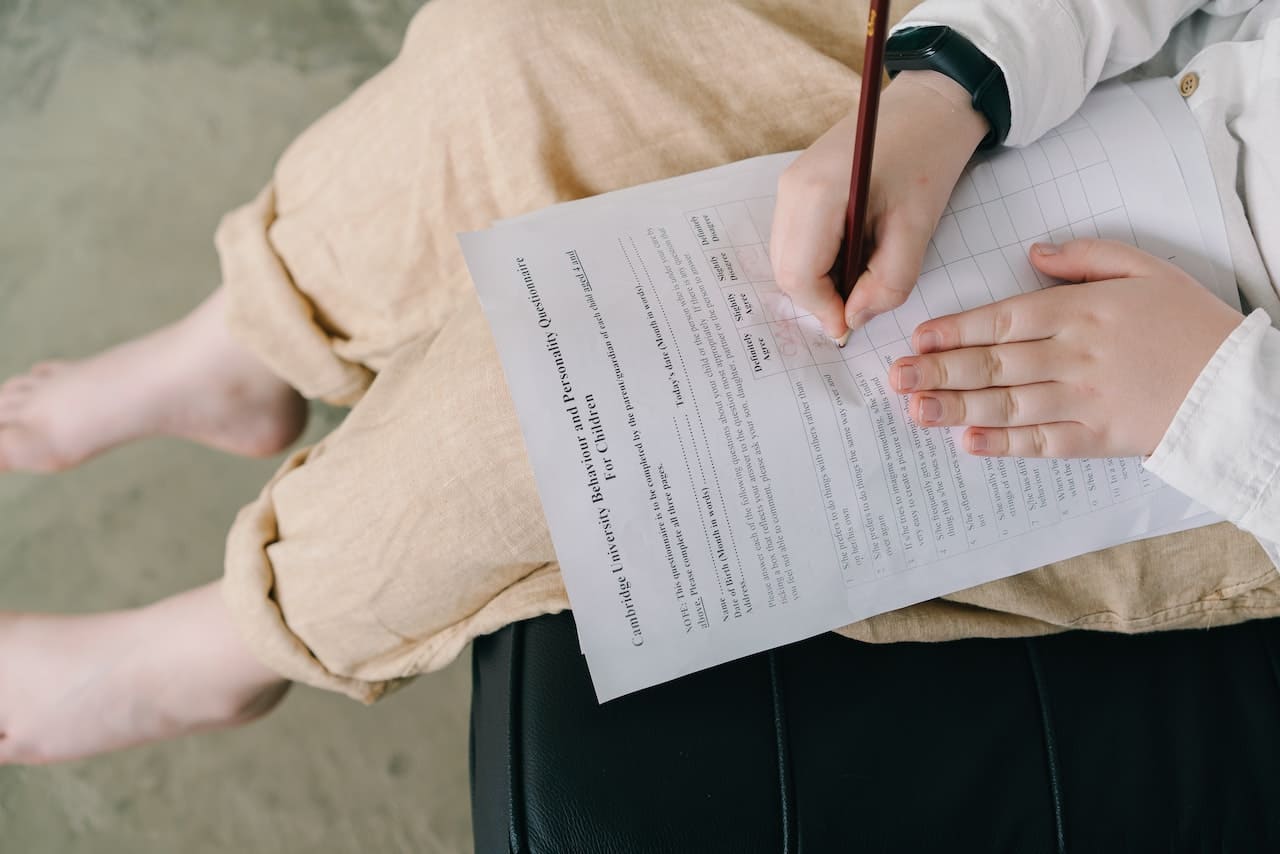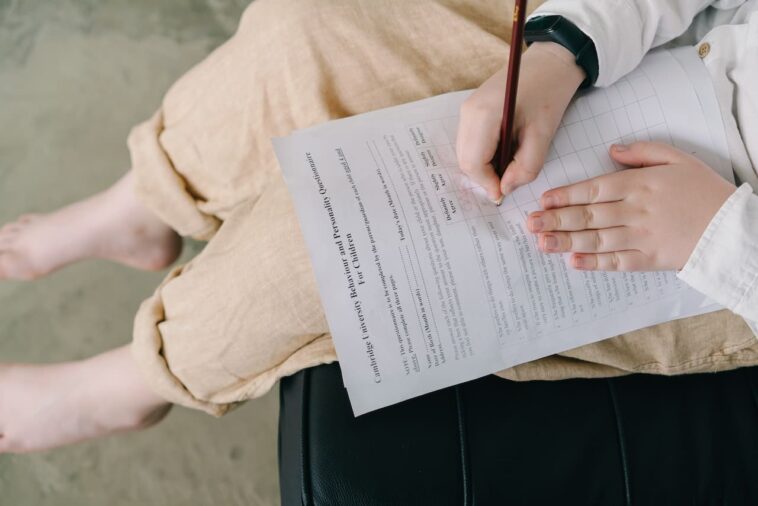Take RAADS R test online if you think you or someone close to you may have autism. The RAADS R test is a self-report questionnaire that determines if individuals have autism spectrum disorder (ASD) and how severe it is. It has questions that help assess behaviors and characteristics frequently linked to ASD.
Instructions: Please read the statements listed below. Answer each item that you believe accurately describes your condition.
I am a sympathetic person.
I often use words and phrases from movies and television in conversations.
I am often surprised when others tell me I have been rude.
Sometimes I talk too loudly or too softly, and I am not aware of it.
I often don't know how to act in social situations.
I can 'put myself in other people's shoes.'
I have a hard time figuring out what some phrases mean, like 'you are the apple of my eye.'
I only like to talk to people who share my special interests.
I focus on details rather than the overall idea.
I always notice how food feels in my mouth. This is more important to me than how it tastes.
I miss my best friends or family when we are apart for a long time.
Sometimes I offend others by saying what I am thinking, even if I don't mean to.
I only like to think and talk about a few things that interest me.
I'd rather go out to eat in a restaurant by myself than with someone I know.
I cannot imagine what it would be like to be someone else.
I have been told that I am clumsy or uncoordinated.
Others consider me odd or different.
I understand when friends need to be comforted.
I am very sensitive to the way my clothes feel when I touch them. How they feel is more important to me than how they look.
I like to copy the way certain people speak and act. It helps me appear more normal.
It can be very intimidating for me to talk to more than one person at the same time.
I have to 'act normal' to please other people and make them like me.
Meeting new people is usually easy for me.
I get highly confused when someone interrupts me when I am talking about something I am very interested in.
It is difficult for me to understand how other people are feeling when we are talking.
I like having a conversation with several people, for instance around a dinner table, at school or at work.
I take things too literally, so I often miss what people are trying to say.
It is very difficult for me to understand when someone is embarrassed or jealous.
Some ordinary textures that do not bother others feel very offensive when they touch my skin.
I get extremely upset when the way I like to do things is suddenly changed.
I have never wanted or needed to have what other people call an 'intimate relationship.'
It is difficult for me to start and stop a conversation. I need to keep going until I am finished.
I speak with a normal rhythm.
The same sound, color or texture can suddenly change from very sensitive to very dull.
The phrase 'I've got you under my skin' makes me uncomfortable.
Sometimes the sound of a word or a high-pitched noise can be painful to my ears.
I am an understanding type of person.
I do not connect with characters in movies and cannot feel what they feel.
I cannot tell when someone is flirting with me.
I can see in my mind in exact detail things that I am interested in.
I keep lists of things that interest me, even when they have no practical use (for example sports statistics, train schedules, calendar dates, historical facts and dates).
When I feel overwhelmed by my senses, I have to isolate myself to shut them down.
I like to talk things over with my friends.
I cannot tell if someone is interested or bored with what I am saying.
It can be very hard to read someone's face, hand and body movements when they are talking.
The same thing (like clothes or temperatures) can feel very different to me at different times.
I feel very comfortable with dating or being in social situations with others.
I try to be as helpful as I can when other people tell me their personal problems.
I have been told that I have an unusual voice (for example flat, monotone, childish, or high-pitched).
Sometimes a thought or a subject gets stuck in my mind and I have to talk about it even if no one is interested.
I do certain things with my hands over and over again (like flapping, twirling sticks or strings, waving things by my eyes).
I have never been interested in what most of the people I know consider interesting.
I am considered a compassionate type of person.
I get along with other people by following a set of specific rules that help me look normal.
It is very difficult for me to work and function in groups.
When I am talking to someone, it is hard to change the subject. If the other person does so, I can get very upset and confused.
Sometimes I have to cover my ears to block out painful noises (like vacuum cleaners or people talking too much or too loudly).
I can chat and make small talk with people.
Sometimes things that should feel painful are not (for instance when I hurt myself or burn my hand on the stove).
When talking to someone, I have a hard time telling when it is my turn to talk or to listen.
I am considered a loner by those who know me best.
I usually speak in a normal tone.
I like things to be exactly the same day after day and even small changes in my routines upset me.
How to make friends and socialize is a mystery to me.
It calms me to spin around or to rock in a chair when I'm feeling stressed.
The phrase, 'He wears his heart on his sleeve,' does not make sense to me.
If I am in a place where there are many smells, textures to feel, noises or bright lights, I feel anxious or frightened.
I can tell when someone says one thing but means something else.
I like to be by myself as much as I can.
I keep my thoughts stacked in my memory like they are on filing cards, and I pick out the ones I need by looking through the stack and finding the right one (or another unique way).
The same sound sometimes seems very loud or very soft, even though I know it has not changed.
I enjoy spending time eating and talking with my family and friends.
I can't tolerate things I dislike (like smells, textures, sounds or colors).
I don't like to be hugged or held.
When I go somewhere, I have to follow a familiar route or I can get very confused and upset.
It is difficult to figure out what other people expect of me.
I like to have close friends.
People tell me that I give too much detail.
I am often told that I ask embarrassing questions.
I tend to point out other people's mistakes.
Is the RAADS R test accurate? Yes, the RAADS test reliability is guaranteed. Healthcare experts working with people with ASD administer this exam. The RAADS R test scoring is a useful diagnostic tool for determining if individuals with autism spectrum disorder are affected by it.
The RAADS R test score meaning depends on a total score range of 0 to 240, with a higher score suggesting behavior and symptoms typical of autism. A RAADS R test score of 65 or above is indicative of autism. For people with autism, the threshold raw score of 65 is approximately at the 3rd percentile but above the 99th percentile for neurotypical adults.
Signs and Causes of ASD
Kids and adults can be tested for autism using the RAADS R test. Autism signs may become apparent in infancy. Some children appear to grow up normally with their companions, but with time they become aloof and lose their language skills. Most autistic children have overt symptoms by the time they are two or three years old.
Autistic individuals have a harder time interacting or communicating with people than their peers. Furthermore, other signs of autism include challenges in comprehending or using gestures, keeping a gaze, making facial expressions, having difficulty expressing or understanding feelings, and having other social difficulties.
Although one autistic individual may have minor symptoms and another may have more severe ones, both suffer from ASD. How can an individual get ASD? The most common cause of autism is genes. Other factors that can cause autism include exposure to environmental chemicals, particularly for people predisposed to genetic abnormalities.
What’s Next?
After answering the RAADS R test questions, contact a healthcare provider who works with people with ASD. They may likely conduct similar tests to confirm the diagnosis.
If ASD is diagnosed, treatment options are available. The aim of treatment is to improve your autistic person’s functioning by minimizing the symptoms of ASD and fostering growth and learning. Your kid may learn important social, communicative, functional, and behavioral skills with early intervention throughout the preschool years.
For each patient, a varied set of treatments and therapy works best. Therapy can significantly lessen symptoms and assist autistic individuals with everyday tasks. According to research, early diagnosis and therapies are more likely to improve skills significantly.
At routine checks, the doctor will search for indicators of developmental delays. You will probably be referred to a specialist who handles kids with ASD for an examination if your child exhibits any symptoms.
The variety of social, linguistic, and behavioral challenges linked to autism spectrum condition is addressed in several programs. Some programs concentrate on minimizing problematic behaviors and imparting fresh knowledge.
Other initiatives concentrate on instructing kids to behave in social situations or improve their interpersonal communication. Through a reward-based incentive system, applied behavior analysis (ABA) can assist youngsters in learning new skills.
If you suspect that your child has ASD, take the RAADS R test to know more. However, consult a specialist as only they can conduct a thorough assessment for accurate diagnosis.


